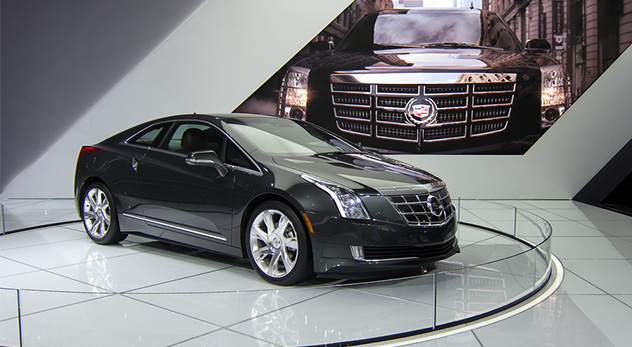
The $75,000 2014 Cadillac ELR showcased at the 2013 Chicago Auto Show – Image courtesy of Rushdi13 (http://bit.ly/1bXjwnK)
Standing in front of a luxury pool, a hyper-masculine American working man asks, “Why do we work so hard? For this? For stuff?”
For one minute and two seconds, a new Cadillac commercial that debuted in primetime during the Sochi Olympics attempts to answer that question. The advertisement is jarring and brash, mocking workers in other countries who take a month off in the summer and crediting Americans’ success to being “crazy driven hard-working believers.”
“You work hard, create your own luck, and you gotta believe anything is possible,” the ad’s star says as he powers up his Cadillac ELR, a sleek vehicle that comes with a $75,000 price tag.
“As for all the stuff? That’s the upside of only taking two weeks off in August.”
http://www.youtube.com/watch?v=Q4hI6koIRYk
The advertisement for the newest addition to Cadillac’s opulent fleet encourages Americans to continue worshipping at the altar of work and stuff because, well, it’s worth it. That tingly feeling when you power up your expensive car or jiggle the handle of your mammoth McMansion is what really matters. Any sacrifices made in terms of spiritual vitality, the wellbeing of one’s family, or personal health are little more than collateral damage.
But like most ads, Cadillac’s bold missive only tells part of the story. It omits recent research indicating that workaholism is linked to reduced physical and mental wellbeing. It skips over that families are adversely affected by the habits of workaholic breadwinners, and may develop mental health problems as a result. It doesn’t touch on the marital problems—including intimacy issues—that arise in workaholic households.
Who has time for such details when you’re trying to sell a vehicle valued around 150% of the average American annual household income?
The Christian faith has something to say about the materialistic, consumerist, greed-driven notions displayed in this ad that animate much of American culture:
- The Ten Commandments forbade covetousness and instituted economic and physical rest during the workweek by way of Sabbath.
- The Old Testament prophets from Jeremiah to Amos to Isaiah railed against the blind greed of the Israelites that focused on material wealth and forgot the poor.
- The Apostle Paul said that the desire for riches leads to a legion of problems that “plunge people into ruin and destruction.”
- The writer of Hebrews encouraged God-followers not to love money but to be content with what they have.
- Jesus—the one who had “nowhere to lay his head,” much less a luxury vehicle in which to dart around Israel—warned against hoarding “stuff.”
So Christians should be bothered by messages such as this one. But they aren’t.
In my faith tradition—evangelical Christianity—I’m struck by an absence of preaching, teaching, and talking about these kinds of Biblical ideas. Perhaps it is because materialism has become a respectable sin or maybe it is because we need the wealthy to bankroll our massive ministry budgets and mammoth church building projects.
Had the Cadillac commercial featured a gay couple cranking the car and driving away as wedding bells rung, there would have been a tidal wave of criticism from conservative Christians. If it had been laced with Go-Daddy-esque busty sexuality, they would have decried the moral decline of American culture. But you’ll not hear a peep here.
Their silence is just another sign that the much of the Western church has Americanized the Christian gospel.
Regardless, the Cadillac advertisement offers the faithful an opportunity to consider the ways in which we have been unwittingly co-opted into potentially destructive, prevailing mindsets. It provides occasion to pause and reflect on how we can live into healthier, more sanctified rhythms. The abundant life is comprised of more than swimming pools and expensive cars.
“Why do we work so hard?” the commercial asks.
Maybe we shouldn’t.





